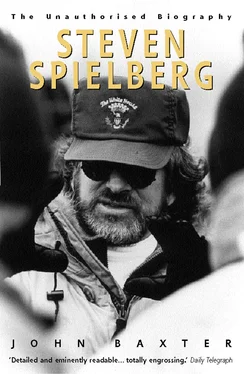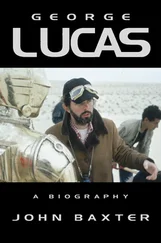If Spielberg auditions someone in person, it is seldom with a scene from the film. Usually he asks for some trivial physical action. On Raiders he held casting sessions in the Lucasfilm kitchen, asking nonplussed actors to mix and bake cookies, in an attempt to throw them back on their natural reactions. Emily Richard, the hero’s mother in Empire of the Sun , was requested simply to put her hair up for a moment. ‘He actually blushed when he asked me,’ says Richard, ‘and I blushed when I did it.’
William Atherton’s physical appearance rather than his acting recommended him for Clovis in Sugarland . ‘He’s a very soft-spoken individual with wild eyes,’ Spielberg said. ‘He could be so easily misunderstood by somebody with a pair of binoculars. One look at Bill [in Looking for Mr Goodbar ] and you think, “My God, he’s going to kill Diane Keaton.”’ Michael Sacks was chosen for ‘Slide’ because Spielberg wanted the cop and Clovis to look as much alike as possible. ‘It’s two men who really began in the same small town, and went in two different directions.’
Casting as he prefers, exactly to type, paid off best in his choice of John Ford veteran Ben Johnson as Chief Tanner. With an actor whose screen persona was so firmly established, direction was superfluous. As Sacks remarked admiringly, ‘he has an extraordinary quality – he can say any cliché to you and make it seem profound.’ So effective was Johnson, however, that Spielberg came to regret his subsidiary role, feeling he should have spent more time on Tanner, explaining the compassion both for his quarry and his men that leads him to chase the fugitives rather than force a shoot-out.
The Poplins’ flight, trailed by scores of police cars, was again structured like a carnival ride, with incidents of random violence – an ambush by vigilante deputies, a chance pile-up at an intersection, the ‘potty stop’ scene, with Clovis flushing a gunman hiding in a Portaloo – breaking the exhilaration of sheer movement. Film historian Diane Jacobs rightly called Spielberg and his coevals ‘excruciatingly conscious of their medium and its history’. Hollywood had nursed them through adolescence and handed them a means of expressing themselves. As a result, they revered its past to a degree that baffled the Suits. The studios’ response to the credit squeeze of the sixties had been to sell backlots for office buildings and auction off their props. In June 1982, however, Spielberg would pay $60,500 at Sotheby-Parke Bernet for one of the surviving ‘Rosebud’ sleds from the last scene of Citizen Kane – a sequence which inspired the last shot of Raiders , where the Ark is sequestered in a giant warehouse choked with anonymous crates.
All Spielberg’s films are ‘about’ cinema before they are about anything else. ‘It’s very clear his references are to film rather than literature,’ says Tom Stoppard, who wrote the script for Spielberg’s version of J.G. Ballard’s Empire of the Sun and acted for more than a year as his informal dramaturg . ‘If one was talking about Captains Courageous , one was talking about Spencer Tracy and the movie, rather than the book.’ Julian Glover says:
It’s not that he ever said, ‘This shot is a copy of one in Stagecoach ; the remake, not the original,’ or, ‘Here’s my Lawrence of Arabia shot. But you just had a sense… He asked me to do one shot [on Indiana Jones and the Lost Crusade ], and I said, ‘Steven, I don’t know why I’m making this move.’ And he said, ‘Well, in Adam’s Rib , Spencer Tracy…’ And I just held up my hands and said, ‘That’s fine.’ Obviously he knew exactly what he was doing.
Kevork Malikyan, who played Kazim in The Last Crusade , had a similar experience. Spielberg spent hours staging his death. He was to collapse into Alison Doody’s arms and slide down her body. After grabbing him, she pulls her hands back to find them covered in blood. The shot refused to gel, and Spielberg dropped it, never mentioning he’d been trying to recreate the death of a disguised Daniel Gelin in the arms of James Stewart in Hitchcock’s remake of The Man who Knew too Much .
One can multiply such stories by the dozen. TV exposed the Brats to more movies than most Hollywood professionals saw in a lifetime. They wore their knowledge self-consciously, even arrogantly, and while Spielberg didn’t carry it to the extremes of Schrader or De Palma, he prepared his first cinema feature with a sense that he was not so much creating something new as building on what had gone before. ‘Once,’ recalls John Milius, ‘Steve and I were talking about how easily we could recreate the atmosphere of a Ford or Hitchcock film. He said, “But how is it we’re able to do that?” and I said, “Simple. We stole it.”’
Older heads despaired of the Brats’ fascination with movie lore. The newcomers, too young to have worked on the films they admired, saw old films not, as their makers did, in terms of personal experience, but as collections of themes, catchphrases, stylistic tricks. Recycling a gibe of Oscar Wilde, British critic Philip French accused them of knowing ‘the credits of everything but the value of nothing’. John Gregory Dunne agreed.
It always struck me that of all the people who were at the Phillipses that summer, there were very few who actually work… the social and cultural mines. [They were] basically gadgeteers. More interested in things … People graduate from Michigan State or wherever, take their book bags, come here to film school, and have no other basis in life except the movies they’ve seen. That’s why they’re making movies about Superman and poltergeists, and about psychic phenomena… Their problem is that they have never done anything.
‘You get the feeling,’ wrote Pauline Kael in an influential review that did much to put Spielberg on the map, ‘that the director grew up with TV and wheels ( My Mother the Car? ), and that he has a new temperament. Maybe Spielberg loves action and comedy and speed so much that he doesn’t really care if the movie has nothing else in it.’
The model for The Sugarland Express was, inevitably, another movie. In 1951, Austrian-born Billy Wilder paid an acid tribute to the affection of his adoptive country for bread and circuses with Ace in the Hole . A reporter named Chuck Tatum, played by Kirk Douglas at his most misanthropic, happens on the story of a lifetime, a man trapped in a mine under a New Mexico mountain. Rescuers expect to dig him out in a day or two, but Tatum, spinning out the story, persuades them to sink a shaft from the top. A ghoulish carnival gathers around the stricken man, with the reporter as its arrogant ringmaster. Tatum becomes famous, but the man dies.
To nobody’s surprise, least of all Wilder’s, Ace in the Hole flopped. ‘Americans expected a cocktail,’ he said, unperturbed, ‘and felt I was giving them a shot of vinegar instead.’ But Spielberg never concealed its affinities with The Sugarland Express : ‘I loved the Ace in the Hole similarity. I liked the idea of people rallying behind a media event, not knowing who the characters are or what they’re about, but just supporting them because they are on an errand of mercy to get their baby back – and that sparks a good deal of good old American sentimentality.’ It was a theme he would return to in 1941 : the power of the media to convince people of almost anything, and the readiness of those people not only to believe what they hear but to act on it, often catastrophically. Sight and Sound saw the connection between Wilder and the anarchic hymns to road violence to which The Sugarland Express superficially belonged by summing it up as ‘ Ace in the Hole meets Vanishing Point ’. Few people grasped that Spielberg, as he been on the side of the truck rather than the car in Duel , wasn’t deploring mob rule in Sugarland Express but relishing it.
Читать дальше












